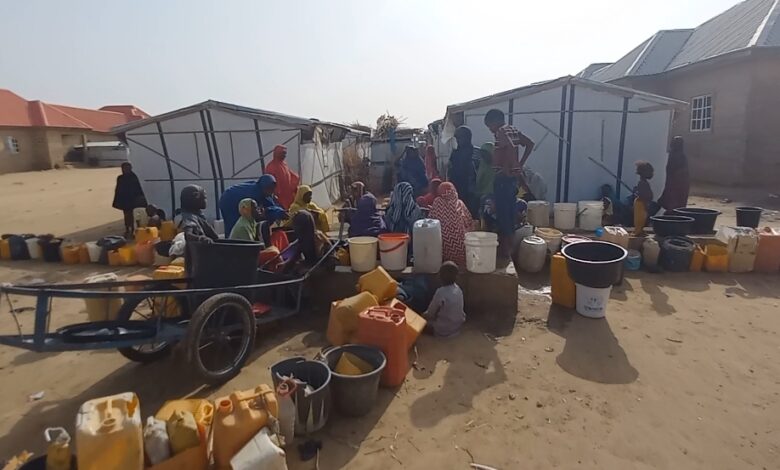Water Scarcity Hits Borno’s Gubio IDP Camp
The hunger facing the displaced in yet-to-be closed camps in Borno State, Northeast Nigeria may be putting the lives of many on edge, but the recent water scarcity, especially in Gubio camp poses more threat to their collective well-being.

Internally Displaced Persons (IDPs) in Gubio camp, near Maiduguri, Borno State, Northeast Nigeria have lamented the shortage of water supply. They either have to trek long distances under extreme conditions to fetch some or buy at exorbitant prices.
“We buy water from a supplier who drives with a water tanker at N60 per 20-litre jerrycan,” Baba Zakari, an IDP in the camp, said.
Gubio camp used to depend on solar-powered boreholes which usually attracted long queues as members, mostly women and children, spent hours waiting for the slow running tap to fill up their vessels.
“But even the boreholes are no longer functioning well now, which created a very difficult water problem for us here.”
Aminatu Ibrahim, a mother of five children said, “my children and I have to trek as far as 3km under the scorching heat of the sun to fetch water.
I do not have N60 to buy a jerrycan of water from the water tanker that comes in here to sell.”
HumAngle observed that this is happening at a time of extreme weather conditions when the sun heats up to 45°c, causing general dehydration for those who have no artificial means of cooling their bodies.
“With this scarcity, there is little one can do with the available water,” Zakari said.
“Ordinarily, constant bathing is what is required in this heat period, especially during Ramadan, to survive dehydration, but that is not even possible.”
He said many of the IDPs have to worry less about their hygiene by skipping bathing to save water.
“Children may have to go for days without bathing and adults would rather not use soap to manage the little water in their homes,” said Balki Muhammadu, a mother of six children.
“We don’t know why ours is different here in Gubio camp. No food, no water and no one is talking about when they would take us out of this place.”
The lack of potable water in a crowded displacement centre like Gubio IDP Camp violates the Sustainable Development Goal 6, which insists that government and humanitarian organisations should “ensure availability and sustainable management of water and sanitation for all.”
Gubio camp has about 30,000 people spread across 4,116 households.
Support Our Journalism
There are millions of ordinary people affected by conflict in Africa whose stories are missing in the mainstream media. HumAngle is determined to tell those challenging and under-reported stories, hoping that the people impacted by these conflicts will find the safety and security they deserve.
To ensure that we continue to provide public service coverage, we have a small favour to ask you. We want you to be part of our journalistic endeavour by contributing a token to us.
Your donation will further promote a robust, free, and independent media.
Donate HereStay Closer To The Stories That Matter




